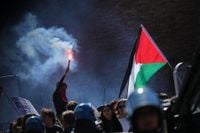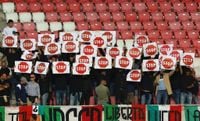It was a Friday unlike any other at Florence’s Coverciano training center, the home base of Italy’s national football team. On October 3, 2025, the usually tranquil facility became the focal point of a passionate protest, as pro-Palestinian activists gathered outside its gates. Their demand? The cancellation of Italy’s upcoming World Cup qualifier against Israel, a fixture scheduled for October 14 in Udine, as tensions over the ongoing conflict in Gaza cast a long shadow over European football.
The demonstration was not an isolated event. It was part of a massive national strike that swept across Italy, with more than two million people participating, according to the country’s largest union. The strike itself was triggered by the recent interdiction of the Global Sumud Flotilla by Israeli forces—a humanitarian aid mission bound for Gaza that was intercepted in the Mediterranean Sea. The Israeli navy’s actions, which included the detention of activists aboard the flotilla, sparked outrage and ignited a wave of protests in dozens of Italian cities since Wednesday night, October 1–2.
By Friday, the anger had spilled over into the world of sports. Protesters, mostly workers and students, approached the gates of the training center, holding banners and chanting slogans in solidarity with Palestinians and the detained flotilla activists. One banner, held aloft on the opposite side of the street from the football complex, read in Italian, "Let’s stop Zionism with the resistance." The demonstration remained peaceful at Coverciano, even as emotions ran high. A protest leader, grabbing a microphone, shouted, "How can you still allow Israel, a Zionist and criminal state, to play football games?" The message was clear: for these demonstrators, football could not be separated from the broader political and humanitarian crisis unfolding in Gaza.
The Italian national team itself was not present at the facility on Friday. The squad is scheduled to convene at Coverciano on Monday, October 6, to begin preparations for the crucial World Cup qualifier. But the players’ absence did little to dampen the protesters’ fervor. Their call for action extended beyond the pitch, echoing throughout the country as the strike brought much of Italy to a standstill. Hundreds of trains were cancelled or delayed, several domestic flights were affected, and both private and public schools closed their doors for the day. In some cities, like Milan, the demonstrations briefly turned tense—protesters blocking the city’s ring road threw bottles at police, who responded with smoke bombs. Still, the vast majority of protests, including the one at Coverciano, remained peaceful.
The upcoming match between Italy and Israel now hangs in the balance, with UEFA reportedly considering suspending Israel from international competition due to the war in Gaza. This possibility has only intensified the debate within Italian football circles. The Italian Football Coaches’ Association (AIAC) had already pushed back in August 2025 for Israel’s suspension from international play, citing the ongoing conflict and its humanitarian consequences. Now, with the qualifier just days away, the pressure on governing bodies to act is mounting.
For some, the issue is not merely about football, but about the role of sports in times of conflict. “Sport should not be used to whitewash crimes or distract from injustice,” argued one protester outside the training center, echoing a sentiment that has resonated in other European countries facing similar dilemmas. The intersection of sports and politics is nothing new, but rarely has it been so starkly on display as in Italy this week.
Italy and Israel have faced off on the football pitch before, most recently in October 2024, when they met in Udine during the Nations League. That match, played under a heavy police presence, went off without incident despite a pro-Palestinian demonstration beforehand. Italy won convincingly, 4-1. But the current climate feels different. The war in Gaza has intensified, and the global response—especially in Europe—has grown more vocal and urgent. The interception of the Global Sumud Flotilla has become a rallying point for activists, who view the upcoming qualifier as an opportunity to make a statement on the world stage.
Friday’s events were part of a broader pattern of unrest sweeping through Italy. The national strike, called by the nation’s largest unions, saw highways blocked and major transportation networks disrupted. The scale of participation—over two million, by some estimates—underscored the depth of feeling among ordinary Italians. For many, the strike was not just about Gaza or the flotilla, but about standing up for humanitarian values and demanding accountability from those in power.
UEFA now faces a difficult decision. Suspending a national team from competition is a rare and serious step, one that carries significant sporting and political consequences. But with protests spreading and public opinion shifting, the pressure is on. The governing body has yet to make an official announcement, but sources suggest that deliberations are ongoing. For the Italian team, the uncertainty is palpable. Will the match go ahead as planned? Or will football take a back seat to the larger issues at play?
Meanwhile, the Italian players prepare for their return to Coverciano on Monday, likely aware that their training ground has become a symbol of a much larger debate. The squad’s focus, at least for now, remains on football. But as the events of the past week have shown, the line between sports and politics is often blurred—sometimes irrevocably so.
As the countdown to October 14 continues, all eyes are on Udine. Will the Italy-Israel World Cup qualifier proceed amid mounting protests and calls for suspension? Or will UEFA intervene, setting a precedent for how international sports respond to geopolitical crises? For now, the situation remains fluid, and the outcome uncertain. One thing is clear: in Italy, football is never just a game, especially when the world is watching.



